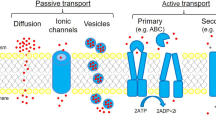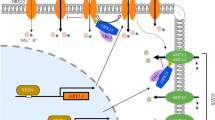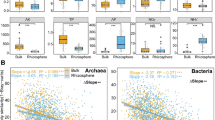Abstract
Purpose
The potential roles of melatonin (MT) in alleviating salt stress in apple plants (Malus hupehensis) are not understood.
Methods
We conducted pot experiments in which such plants were exposed to either 0 or 200 mmol/L NaCl together with 100 μmol/L MT.
Results
MT enhanced salt stress tolerance through activation of the antioxidant system and regulation of Na+ and K+ balance, which restored plant growth. We used high-throughput sequencing and metabolomics methods to investigate the effects of MT on the microbial community structure and metabolite composition of the rhizosphere. Exogenous MT significantly altered the community structure of bacteria and fungi and increased cooperation among microbial communities. In addition, the communities were enriched with microbes in the genera Thauera, Nocardioides, Desulfuromonas, Amaricoccus, and Microascus, potentially beneficial microorganisms regulated by MT. Exogenous MT also altered the metabolite composition of the soil and increased the relative abundance of beneficial metabolites. Importantly, Spearman correlation analysis revealed that potentially beneficial microorganisms appeared to be recruited by the exudation of (2S)-3-hydroxy-1,2-propanediyl dibutanoate.
Conclusions
Our results show that MT effectively reduce ROS, regulate Na+ and K+ balance, and regulate specific microbial communities and metabolites, thus alleviating the inhibitory effects of salt stress. These results improve our understanding of the mechanisms by which MT alleviates salt stress in plants.







Similar content being viewed by others
Data Availability
Data is available on request to the corresponding author.
Change history
21 December 2023
A Correction to this paper has been published: https://doi.org/10.1007/s11104-023-06452-2
References
Alavilli H, Yolcu S, Skorupa M, Aciksoz SB, Asif M (2023) Salt and drought stress-mitigating approaches in sugar beet (Beta vulgaris L.) to improve its performance and yield. Planta 258:30. https://doi.org/10.1007/s00425-023-04189-x
Altaf MA, Shahid R, Ren MX, Naz S, Altaf MM, Qadir A, Anwar M, Shakoor A, Hayat F (2020) Exogenous melatonin enhances salt stress tolerance in tomato seedlings. Biol Plantarum 64:604–615. https://doi.org/10.32615/bp.2020.090
Arnao MB, Giraldo-Acosta M, Castejon-Castillejo A, Losada-Loran M, Sanchez-Herrerias P, El Mihyaoui A, Cano A, Hernandez-Ruiz J (2023) Melatonin from microorganisms, algae, and plants as possible alternatives to synthetic melatonin. Metabolites 13:72. https://doi.org/10.3390/metabo13010072
Asif M, Tunc CE, Yazici MA, Tutus Y, Rehman R, Rehman A, Ozturk L (2019) Effect of predicted climate change on growth and yield performance of wheat under varied nitrogen and zinc supply. Plant Soil 434:231–244. https://doi.org/10.1007/s11104-018-3808-1
Asif M, Zora S, Ceylan Y, Rehman R, Ozturk L (2020) Nitrogen supply in combination of nitrate and ammonium enhances harnessing of elevated atmospheric CO2 through improved nitrogen and carbon metabolism in wheat (Triticum aestivum). Crop Pasture Sci 71:101–112. https://doi.org/10.1071/CP19308
Badri DV, Chaparro JM, Zhang RF, Shen QR, Vivanco JM (2013) Application of natural blends of phytochemicals derived from the root exudates of Arabidopsis to the soil reveal that phenolic-related compounds predominantly modulate the soil microbiome. J Biol Chem 288:30503–30503. https://doi.org/10.1074/jbc.A112.433300
Cai DY, Xu Y, Zhao F, Zhang Y, Duan HR, Guo XN (2021) Improved salt tolerance of Chenopodium quinoa Willd. contributed by Pseudomonas sp. strain M30–35. Peer J 9:e10702. https://doi.org/10.7717/peerj.10702
Cao Y, Du PH, Yin BY, Zhou SS, Li ZY, Zhang XY, Xu JZ, Liang BW (2023) Melatonin and dopamine enhance waterlogging tolerance by modulating ROS scavenging, nitrogen uptake, and the rhizosphere microbial community in Malus hupehensis. Plant Soil 483:475–493. https://doi.org/10.1007/s11104-022-05759-w
Castanares JL, Bouzo CA (2019) Effect of exogenous melatonin on seed germination and seedling growth in melon (Cucumis melo L.) under salt stress. Hortic Plant J 5:79–87. https://doi.org/10.1016/j.hpj.2019.01.002
Chai YN, Schachtman DP (2022) Root exudates impact plant performance under abiotic stress. Trends Plant Sci 27:80–91. https://doi.org/10.1016/j.tplants.2021.08.003
Chen YL, Li RK, Ge JF, Liu JG, Wang WB, Xu MF, Zhang R, Hussain S, Wei HH, Dai QG (2021) Exogenous melatonin confers enhanced salinity tolerance in rice by blocking the ROS burst and improving Na+/K+ homeostasis. Environ Exp Bot 189:104530. https://doi.org/10.1016/j.envexpbot.2021.104530
Cheng D, He JZ (2009) Isolation and characterization of "Dehalococcoides" sp strain MB, which dechlorinates tetrachloroethene to trans-1, 2-dichloroethene. Appl Environ Microb 75:5910–5918. https://doi.org/10.1128/AEM.00767-09
Colombage R, Singh MB, Bhalla PL (2023) Melatonin and abiotic stress tolerance in crop plants. Int j Mol Sci 24:7447. https://doi.org/10.3390/ijms24087447
Dong QL, Duan DY, He JL, Zheng WQ, Huang D, Wang Q, Yang J, Ma FW, Mao K (2022) Overexpression of MdVQ37 reduces salt stress tolerance in Malus domestica. Sci Hortic-Amsterdam 300:111077. https://doi.org/10.1016/j.scienta.2022.111077
Du PH, Cao Y, Yin BY, Zhou SS, Li ZY, Zhang XY, Xu JZ, Liang BW (2022) Improved tolerance of apple plants to drought stress and nitrogen utilization by modulating the rhizosphere microbiome via melatonin and dopamine. Front Microbiol 13:980327. https://doi.org/10.3389/fmicb.2022.980327
Gu DC, Xiang XJ, Wu YC, Zeng J, Lin XG (2022) Synergy between fungi and bacteria promotes polycyclic aromatic hydrocarbon cometabolism in lignin-amended soil. J Hazard Mater 425:127958. https://doi.org/10.1016/j.jhazmat.2021.127958
Guo YY, Tian SS, Liu SS, Wang WQ, Sui N (2018) Energy dissipation and antioxidant enzyme system protect photosystem II of sweet sorghum under drought stress. Photosynthetica 56:861–872. https://doi.org/10.1007/s11099-017-0741-0
Guo JJ, Ling N, Li Y, Li KS, Ning HL, Shen QR, Guo SW, Vandenkoornhuyse P (2021) Seed-borne, endospheric and rhizospheric core microbiota as predictors of plant functional traits across rice cultivars are dominated by deterministic processes. New Phytol 230:2047–2060. https://doi.org/10.1111/nph.17297
He X, Yin B, Zhang J, Zhou S, Li Z, Zhang X, Xu J, Liang B (2023) Exogenous melatonin alleviates apple replant disease by regulating rhizosphere soil microbial community structure and nitrogen metabolism. Sci Total Environ 884:163830. https://doi.org/10.1016/j.scitotenv.2023.163830
Hopmans JW, Qureshi AS, Kisekka I, Munns R, Grattan SR, Rengasamy P, Ben-Gal A, Assouline S, Javaux M, Minhas PS, Raats PAC, Skaggs TH, Wang G, van Lier QD, Jiao H, Lavadon RS, Lazarovitch N, Li B, Taleisnik E (2021) Critical knowledge gaps and research priorities in global soil salinity. Adv Agron 169:1–191. https://doi.org/10.1016/bs.agron.2021.03.001
Jiang CQ, Cui QR, Feng K, Xu DF, Li CF, Zheng QS (2016) Melatonin improves antioxidant capacity and ion homeostasis and enhances salt tolerance in maize seedlings. Acta Physiol Plant 38:82. https://doi.org/10.1007/s11738-016-2101-2
Jiang D, Lu B, Liu LT, Duan WJ, Meng YJ, Li J, Zhang K, Sun HC, Zhang YJ, Dong HZ, Bai ZY, Li CD (2021) Exogenous melatonin improves the salt tolerance of cotton by removing active oxygen and protecting photosynthetic organs. BMC Plant Biol 21:331. https://doi.org/10.1186/s12870-021-03082-7
Kumawat KC, Nagpal S, Sharma P (2022) Potential of plant growth-promoting rhizobacteria-plant interactions in mitigating salt stress for sustainable agriculture: A review. Pedosphere 32:223–245. https://doi.org/10.1016/S1002-0160(21)60070-X
Li C, Sun XK, Chang C, Jia DF, Wei ZW, Li CY, Ma FW (2015) Dopamine alleviates salt-induced stress in Malus hupehensis. Physiol. Plantarum 153:584–602. https://doi.org/10.1111/ppl.12264
Li JP, Liu J, Zhu TT, Zhao C, Li LY, Chen M (2019) The Role of melatonin in salt stress responses. Int J Mol Sci 20:709. https://doi.org/10.3390/ijms20030709
Li JP, Yuan F, Liu YL, Zhang MJ, Liu Y, Zhao Y, Wang BS, Chen M (2020a) Exogenous melatonin enhances salt secretion from salt glands by upregulating the expression of ion transporter and vesicle transport genes in Limonium bicolor. BMC Plant Biol 20:493. https://doi.org/10.1186/s12870-020-02703-x
Li X, Yao S, Bian Y, Jiang X, Song Y (2020b) The combination of biochar and plant roots improves soil bacterial adaptation to PAH stress: Insights from soil enzymes, microbiome, and metabolome. J Hazard Mater 400:123227. https://doi.org/10.1016/j.jhazmat.2020.123227
Li X, Li B, Zheng Y, Luo L, Qin X, Yang Y, Xu J (2022) Physiological and rhizospheric response characteristics to cadmium of a newly identified cadmium accumulator Coreopsis grandiflora Hogg (Asteraceae). Ecotox Environ Safe 241:113739. https://doi.org/10.1016/j.ecoenv.2022.113739
Liang CZ, Zheng GY, Li WZ, Wang YQ, Hu B, Wang HR, Wu HK, Qian YW, Zhu XG, Tan DX, Chen SY, Chu CC (2015) Melatonin delays leaf senescence and enhances salt stress tolerance in rice. J Pineal Res 59:91–101. https://doi.org/10.1111/jpi.12243
Lin DX, Li XZ, Hou MX, Chen YL, Zeng J, Yi XS (2022) Aerobic granular sludge cultivated from Fe-loaded activated carbon as carrier working low-strength wastewater conditions by bioreactor. Chemosphere 306:135532. https://doi.org/10.1016/j.chemosphere.2022.135532
Liu J, Shabala S, Zhang J, Ma GH, Chen DD, Shabala L, Zeng FR, Chen ZH, Zhou MX, Venkataraman G, Zhao QZ (2020) Melatonin improves rice salinity stress tolerance by NADPH oxidase-dependent control of the plasma membrane K+ transporters and K+ homeostasis. Plant Cell Environ 43:2591–2605. https://doi.org/10.1111/pce.13759
Liu TT, Xing GM, Chen ZF, Zhai XJ, Wei XY, Wang C, Li TM, Zheng SW (2022) Effect of exogenous melatonin on salt stress in cucumber: alleviating effect and molecular basis. Biotechnol Biotec Eq 36:818–827. https://doi.org/10.1080/13102818.2022.2128875
Ma Y, Xue H, Zhang F, Jiang Q, Yang S, Yue PT, Wang F, Zhang YY, Li LG, He P, Zhang ZH (2021) The miR156/SPL module regulates apple salt stress tolerance by activating MdWRKY100 expression. Plant Biotechnol Journal 19:311–323. https://doi.org/10.1111/pbi.13464
Madigan AP, Egidi E, Bedon F, Franks AE, Plummer KM (2019) Bacterial and fungal communities are differentially modified by melatonin in agricultural soils under abiotic stress. Front Microbiol 10:2616. https://doi.org/10.3389/fmicb.2019.02616
Melino V, Tester M (2023) Salt-tolerant crops: time to deliver. Annu Rev Plant Biol 74:671–696. https://doi.org/10.1146/annurev-arplant-061422-104322
Niu SQ, Gao Y, Zi HX, Liu Y, Liu XM, Xiong XQ, Yao QQ, Qin ZW, Chen N, Guo L, Yang YZ, Qin P, Lin JZ, Zhu YH (2022) The osmolyte-producing endophyte Streptomyces albidoflavus OsiLf-2 induces drought and salt tolerance in rice via a multi-level mechanism. Crop J 10:375–386. https://doi.org/10.1016/j.cj.2021.06.008
Ohore OE, Qin ZR, Sanganyado E, Wang YW, Jiao XY, Liu WH, Wang Z (2022) Ecological impact of antibiotics on bioremediation performance of constructed wetlands: Microbial and plant dynamics, and potential antibiotic resistance genes hotspots. J Hazard Mater 424:127495. https://doi.org/10.1016/j.jhazmat.2021.127495
Olenska E, Malek W, Wojcik I, Swiecicka I, Thijs S, Vangronsveld J (2020) Beneficial features of plant growth-promoting rhizobacteria for improving plant growth and health in challenging conditions: A methodical review. Sci Total Environ 743:140682. https://doi.org/10.1016/j.scitotenv.2020.140682
Parihar P, Singh S, Singh R, Singh VP, Prasad SM (2015) Effect of salinity stress on plants and its tolerance strategies: a review. Environ Sci Pollut R 22:4056–4075. https://doi.org/10.1007/s11356-014-3739-1
Peng JL, Guo JH, Lei Y, Mo JZ, Sun HT, Song JX (2021) Integrative analyses of transcriptomics and metabolomics in Raphidocelis subcapitata treated with clarithromycin. Chemosphere 266:128993. https://doi.org/10.1016/j.chemosphere.2020.128933
Qu Q, Li Y, Zhang ZY, Cui HZ, Zhao QQ, Liu WY, Lu T, Qian HF (2021) Effects of S-metolachlor on wheat (Triticum aestivum L.) seedling root exudates and the rhizosphere microbiome. J Hazard Mater 411:125137. https://doi.org/10.1016/j.jhazmat.2021.125137
Song TZ, Shi YY, Shen LK, Cao CJ, Shen Y, Jing W, Tian QX, Lin F, Li WY, Zhang WH (2021) An endoplasmic reticulum-localized cytochrome b(5) regulates high-affinity K+ transport in response to salt stress in rice. Proc Natl Acad Sci USA 118:e2114347118. https://doi.org/10.1073/pnas.2114347118
Song Z, Yang Q, Dong B, LiN WM, Du T, Liu N, Niu L, Jin H, Meng D, Fu Y (2022) Melatonin enhances stress tolerance in pigeon pea by promoting flavonoid enrichment, particularly luteolin in response to salt stress. J Exp Bot 73:5992–6008. https://doi.org/10.1093/jxb/erac276
Su QF, Zheng XD, Tian YK, Wang CH (2020) Exogenous brassinolide alleviates salt stress in Malus hupehensis Rehd. by regulating the transcription of NHX-type Na+(K+)/H+ antiporters. Front Plant Sci 11:38. https://doi.org/10.3389/fpls.2020.00038
Su Y, Peng Y, Wang J, Zhang Q, Li X, Wang S, Xue X, Du R (2023) Rapid enrichment of anammox bacteria and transformation to partial denitrification/anammox with nitrification/denitrification sludge. Sci Total Environ 856:158973. https://doi.org/10.1016/j.scitotenv.2022.158973
Sun YM, Guo JJ, Ruan Y, Zhang T, Fernie AR, Yuan HY (2022) The recruitment of specific rhizospheric bacteria facilitates Stevia rebaudiana salvation under nitrogen and/or water deficit stresses. Ind Crop Prod 187:115434. https://doi.org/10.1016/j.indcrop.2022.115434
Suttinun O, Muller R, Luepromchai E (2010) Cometabolic degradation of trichloroethene by Rhodococcus sp strain L4 immobilized on plant materials rich in essential oils. Appl Environ Microb 76:4684–4690. https://doi.org/10.1128/AEM.03036-09
Vandenkoornhuyse P, Quaiser A, Duhamel M, Le Van A, Dufresne A (2015) The importance of the microbiome of the plant holobiont. New Phytol 206:1196–1206. https://doi.org/10.1111/nph.13312
Wang X, Fang LC, Beiyuan JZ, Cui YX, Peng Q, Zhu SL, Wang M, Zhang XC (2021a) Improvement of alfalfa resistance against Cd stress through rhizobia and arbuscular mycorrhiza fungi co-inoculation in Cd-contaminated soil. Environ Pollut 277:116758. https://doi.org/10.1016/j.envpol.2021.116758
Wang YQ, Wang MX, Chen YY, Li CM, Zhou ZF (2021b) Microbial community structure and co-occurrence are essential for methanogenesis and its contribution to phenanthrene degradation in paddy soil. J Hazard Mater 417:126086. https://doi.org/10.1016/j.jhazmat.2021.126086
Wen T, Dong LJ, Wang L, Ma FW, Zou YJ, Li CY (2018) Changes in root architecture and endogenous hormone levels in two Malus rootstocks under alkali stress. Sci Hortic-Amst 235:198–204. https://doi.org/10.1016/j.scienta.2017.09.015
Yang H, Dai LJ, Wei YX, Deng Z, Li DJ (2020a) Melatonin enhances salt stress tolerance in rubber tree (Hevea brasiliensis) seedlings. Ind Crop Prod 145:111990. https://doi.org/10.1016/j.indcrop.2019.111990
Yang JF, Duan YM, Zhang RQ, Liu C, Wang YJ, Li M, Ding YY, Awasthi MK, Li HK (2020b) Connecting soil dissolved organic matter to soil bacterial community structure in a long-term grass-mulching apple orchard. Ind Crop Prod 149:112344. https://doi.org/10.1016/j.indcrop.2020.112344
Yang J, Guo X, Li WH, Chen PH, Cheng YP, Ma FW, Mao K (2021) MdCCX2 of apple functions positively in modulation of salt tolerance. Environ Exp Bot 192:104663. https://doi.org/10.1016/j.envexpbot.2021.104663
Yu YC, Wang AM, Li X, Kou M, Wang WJ, Chen XY, Xu T, Zhu MK, Ma DF, Li ZY, Sun J (2018) Melatonin-stimulated triacylglycerol breakdown and energy turnover under salinity stress contributes to the maintenance of plasma membrane H+-ATPase activity and K+/Na+ homeostasis in sweet potato. Front Plant Sci 9:256. https://doi.org/10.3389/fpls.2018.00256
Yu P, He XM, Baer M, Beirinckx S, Tian T, Moya YAT, Zhang XC, Deichmann M, Frey FP, Bresgen V, Li CJ, Razavi BS, Schaaf G, von Wiren N, Su Z, Bucher M, Tsuda K, Goormachtig S, Chen XP, Hochholdinger F (2021) Plant flavones enrich rhizosphere Oxalobacteraceae to improve maize performance under nitrogen deprivation. Nat Plants 7:481–+. https://doi.org/10.1038/s41477-021-00897-y
Zhang JL, Aziz M, Qiao Y, Han QQ, Li J, Wang YQ, Shen X, Wang SM, Pare PW (2014) Soil microbe Bacillus subtilis (GB03) induces biomass accumulation and salt tolerance with lower sodium accumulation in wheat. Crop Pasture Sci 65:423–427. https://doi.org/10.1071/CP13456
Zhang XY, Li SH, Tang T, Liu YD, Tahir MM, Wang C, Meng ZQ, Niu JX, Yang WW, Ma JJ, Zhang D (2022) Comparison of morphological, physiological, and related-gene expression responses to saline-alkali stress in eight apple rootstock genotypes. Sci Hortic-Amst 306:111455. https://doi.org/10.1016/j.scienta.2022.111455
Acknowledgements
This work was supported by the Natural Science Foundation of Hebei (C2021204158), the Natural Science Foundation of Shandong Province (ZR2020QC146), the Earmarked Fund for Hebei Apple Innovation Team of Modern Agroindustry Technology Research System (HBCT2021100210), the Introduced Talents Project of Hebei Agricultural University (YJ201904) and the Earmarked Fund for the China Agricultural Research System (CARS-27).
Author information
Authors and Affiliations
Corresponding authors
Ethics declarations
Competing interest
The authors declare that they have no known competing financial interests or personal relationships that could have appeared to influence the work reported in this paper.
Additional information
Responsible Editor: Al Imran Malik.
Publisher's Note
Springer Nature remains neutral with regard to jurisdictional claims in published maps and institutional affiliations.
Supplementary Information
ESM 1
(DOCX 461 KB)
Rights and permissions
Springer Nature or its licensor (e.g. a society or other partner) holds exclusive rights to this article under a publishing agreement with the author(s) or other rightsholder(s); author self-archiving of the accepted manuscript version of this article is solely governed by the terms of such publishing agreement and applicable law.
About this article
Cite this article
Ma, C., Cao, Y., Shang, Y. et al. Melatonin enhances the tolerance of apple seedlings to salt stress by regulating the microbial community structure and metabolite composition of the rhizosphere. Plant Soil 497, 467–481 (2024). https://doi.org/10.1007/s11104-023-06407-7
Received:
Accepted:
Published:
Issue Date:
DOI: https://doi.org/10.1007/s11104-023-06407-7




